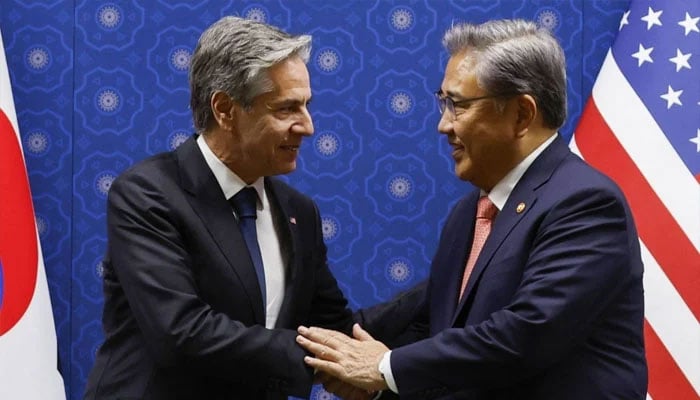S Korea sees no change in US ties regardless of November election
The US State Department did not immediately respond to a request for comment
SEOUL: South Korea expects no fundamental shift in relations with the United States even if US voters elect a new president, but hopes to make progress on defence cost-sharing talks and other issues this year, a senior presidential official said.
The official, speaking with a small group of journalists on Monday, said that South Korea does not devise its policy based on predictions on the US presidential election in November, but that both sides will try to advance efforts to bolster security partnerships before that.
The allies have agreed to launch early talks on sharing the cost of keeping US troops in South Korea, and will accelerate discussions to boost Seoul’s say in operating US extended deterrence, including American nuclear umbrella, the official said.
“There is an incentive for the Biden administration to work more actively on the issues as it wraps up its first term this year,” the official said. “We share the need to make some achievements, and that’s why both sides have agreed to begin the defence cost-sharing negotiations and complete the work on extended deterrence.”
The US State Department did not immediately respond to a request for comment, but has said that its delegation visited South Korea in December to discuss the defence cost-sharing deal and would work with Seoul to prepare for talks on the next agreement.
Former President Donald Trump, favoured to be the Republican candidate in the election, had accused South Korea, a key Asian ally, of “free-riding” on US military might, called for stopping what he called “expensive” war games, and demanded that Seoul pay as much as $5 billion a year for the US deployment.
-
 AI Copyright Battle: ByteDance To Curb Seedance 2.0 Amid Disney Lawsuit Warning
AI Copyright Battle: ByteDance To Curb Seedance 2.0 Amid Disney Lawsuit Warning -
 Savannah Guthrie In Tears As She Makes Desperate Plea To Mom's Kidnappers
Savannah Guthrie In Tears As She Makes Desperate Plea To Mom's Kidnappers -
 Canada’s Defence Industrial Strategy Targets 125,000 Jobs And Export Growth
Canada’s Defence Industrial Strategy Targets 125,000 Jobs And Export Growth -
 Tre Johnson, Former NFL Guard And Teacher, Passes Away At 54
Tre Johnson, Former NFL Guard And Teacher, Passes Away At 54 -
 Jerome Tang Calls Out Team After Embarrassing Home Defeat
Jerome Tang Calls Out Team After Embarrassing Home Defeat -
 Cynthia Erivo Addresses Bizarre Rumour About Her Relationship With Ariana Grande
Cynthia Erivo Addresses Bizarre Rumour About Her Relationship With Ariana Grande -
 Prince Harry, Meghan Markle Spotted Cosying Up At NBA All-Star Game
Prince Harry, Meghan Markle Spotted Cosying Up At NBA All-Star Game -
 Lady Gaga Explains How Fibromyalgia Lets Her 'connect With People Who Have It'
Lady Gaga Explains How Fibromyalgia Lets Her 'connect With People Who Have It' -
 Metro Detroit Weather Forecast: Is The Polar Vortex Coming Back?
Metro Detroit Weather Forecast: Is The Polar Vortex Coming Back? -
 Daniel Radcliffe Reveals Surprising Way Fatherhood Changed Him
Daniel Radcliffe Reveals Surprising Way Fatherhood Changed Him -
 ‘Disgraced’ Andrew At Risk Of Breaking Point As Epstein Scandal Continues
‘Disgraced’ Andrew At Risk Of Breaking Point As Epstein Scandal Continues -
 Alan Cumming Shares Plans With 2026 Bafta Film Awards
Alan Cumming Shares Plans With 2026 Bafta Film Awards -
 OpenClaw Founder Peter Steinberger Hired By OpenAI As AI Agent Race Heats Up
OpenClaw Founder Peter Steinberger Hired By OpenAI As AI Agent Race Heats Up -
 Kate Middleton's Reaction To Harry Stepping Back From Royal Duties Laid Bare
Kate Middleton's Reaction To Harry Stepping Back From Royal Duties Laid Bare -
 Rose Byrne Continues Winning Streak After Golden Globe Awards Victory
Rose Byrne Continues Winning Streak After Golden Globe Awards Victory -
 Ice Hockey Olympics Update: Canada Stays Unbeaten With Dominant Win Over France
Ice Hockey Olympics Update: Canada Stays Unbeaten With Dominant Win Over France




